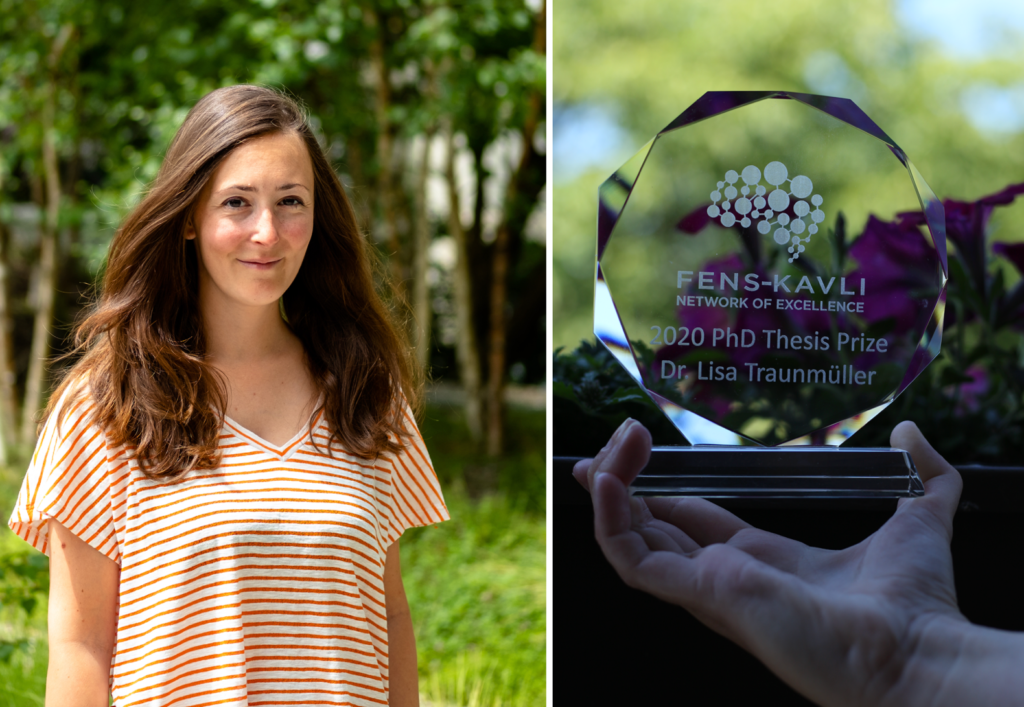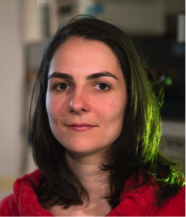The FENS-Kavli Network of Excellence PhD Thesis Prize is awarded every second year at the FENS Forum and honors a young neuroscientist for his/her outstanding PhD thesis in any domain of neuroscience.
Personal prize money: 2.000 €

The Call for Applications closed on 15 February 2024
Results will be announced to the candidates within April 2024
Eligibility
The FKNE PhD Thesis Prize is sponsored by the FENS Committee for Higher Education and Training (CHET).
Nomination/Application Procedure
Applicants may either be nominated by their PhD supervisor, or may self-nominate.
The nomination must include:
=
The FKNE PhD Prize is sponsored by the FENS Committee for Higher Education and Training (CHET).
PhD Prize Selection Committee 2024:

 Dr. Célia Lacaux has been awarded the FENS-Kavli Network of Excellence PhD Thesis Prize in 2022. Dr. Lacaux conducted her PhD project in the lab of Dr. Delphine Oudiette at the Sorbonne University Paris, France.
Dr. Célia Lacaux has been awarded the FENS-Kavli Network of Excellence PhD Thesis Prize in 2022. Dr. Lacaux conducted her PhD project in the lab of Dr. Delphine Oudiette at the Sorbonne University Paris, France.
During her Ph.D., Célia chose to examine the impact of the sleep onset period on creativity. This period was over looked by researchers for decades, and the role of sleep in creativity hasn’t been strongly established. Célia’s first breakthrough was to uncover that patients with narcolepsy, who constantly oscillate between wakefulness and sleep, have an increased creative potential. These findings suggest that ‘hybrid’ states (at the border between wakefulness and sleep) offer a neurophysiological substrate for creativity. Célia then tested healthy subjects, and managed to elegantly confirm the link between this border state and creativity. Overall, her results show that critical cognitive processes occur during sleep onset. Celia’s findings are major and innovative. In the future, neuroscientists could target this period, to elucidate the mechanisms underlying creativity. Celia’s work has been published in influential scientific journals, and received considerable national and international media coverage. The selection committee was delighted to select Dr. Lacaux as the winner out of 64 applicants, many of which were also outstanding.
The prize, which consist of a special plaque and €2,000 Euros, have been awarded at the FENS Forum 2022 on the 9th July.
The FKNE PhD Thesis Prize honors a young neuroscientist for outstanding PhD thesis in any domain of neuroscience.
Download the Press Release
The FKNE PhD Prize is sponsored by the FENS Committee for Higher Education and Training (CHET).
PhD Prize Committee 2022:
Dr. Lisa Traunmüller has been awarded the FENS-Kavli Network of Excellence PhD Thesis Prize. She conducted her PhD project in the lab of Dr. Peter Scheiffele at Biozentrum, University of Basel, Switzerland and addressed a fundamental question in neurobiology: What are the mechanisms that create different, highly specific types of synapses? Her work uncovered an RNA-binding protein which activates a highly specific alternative splicing program to control the properties of glutamatergic synapses. 
FKNE PhD Thesis Prize 2020
Dr. Lisa Traunmüller
UNIBAS Switzerland
She also contributed to work that uncovers how a switch in alternative splicing shapes neurexin repertoires in principal neurons versus interneurons of the hippocampus. Taken together, her work identified the cell type-specific transcript diversification by alternative splicing as a novel and central mechanism for the functional specification of neuronal cell types and circuits. Dr. Traunmüller’s work was published in influential journals and is highly recognised for having a strong impact on the field of neuronal circuit assembly and synapse formation. Therefore, the jury was delighted to select Dr. Traunmüller as the winner out of 56 applicants, many of which were also outstanding.
The FKNE PhD Prize is sponsored by the FENS Committee for Higher Education and Training (CHET).
FKNE PhD Thesis Prize Committee 2020:

 Dr. Arseny Finkelstein has been awarded the inaugural FENS-Kavli Network of Excellence PhD Thesis Prize in 2018.
Dr. Arseny Finkelstein has been awarded the inaugural FENS-Kavli Network of Excellence PhD Thesis Prize in 2018.
Dr. Finkelstein conducted his PhD project in the lab of Dr. Nachum Ulanovsky at the Weizmann Institute in Rehovot, Israel. With meticulous work, he discovered and quantitatively characterized 3D head direction cells in the freely moving bats using his own custom developed tracking device. This system can be considered a 3D compass in the brain. Dr. Finkelstein and colleagues published these results in Nature in 2015. Then, he went on to show that certain neurons of the bat hippocampus encode the directions and the proximity of spatial goals, potentially forming the basis of goal-directed navigation, which work resulted in a shared first author publication in Science. These results are groundbreaking, because navigation is traditionally studied only in two dimensions and extending it to the full space required the development of novel technology applied to an uncommon model organism. This convinced the jury to select Dr. Finkelstein as the winner of 54 entries, which were often also of outstanding quality. Dr. Finkelstein continues his work at Janelia Research Campus, HHMI, USA with Dr. Karel Svoboda.
The prize, which consist of a special plaque and €2,000 Euros, have been awarded at the FENS Forum 2018 on the 9th July.
The FKNE PhD Prize is sponsored by the FENS Committee for Higher Education and Training (CHET).
FKNE PhD Thesis Prize Committee 2018:

Dr. Linda Katona (University of Oxford) has been awarded the inaugural FENS Kavli Network of Excellence PhD Thesis Prize in 2016. 
The thesis published by Dr. Katona – originally from Romania, who graduated from the Department of Pharmacology at the University of Oxford – is a masterpiece for its depth, the originality of the experimental approach employed, as well as for the new insights obtained by her results. During her thesis conducted under the joint supervision of Professors Peter Somogyi (University of Oxford) and Thomas Klausberger (University of Vienna), Dr. Katona physiologically and molecularly characterized in depth the role of different types of GABAergic interneurons in the hippocampus of freely moving rats during distinct oscillatory states. Her results have not only been obtained with state-of-the-art techniques, but will also help to better understand rhythmic network functions during memory processing. Her work led to several publications in top neuroscientific journals and culminated with a first author paper in Neuron. On top of that, Dr. Katona’s thesis is excellently structured, flawlessly written and well illustrated, and convinced the jury to select her as the winner of over 45 other entries, which were often also of outstanding quality. Dr. Katona is currently a postdoctoral fellow at the University of Oxford and continuous to delve into the mysteries of brain rhythmicity underlying different memory systems.
The prizes, which consist of a special plaque and €2,000 Euros each, were awarded at the FENS Forum 2016 on the 4th July.
The FKNE Mentoring Prize is sponsored by the FENS Committee for Higher Education and Training (CHET).
FKNE PhD Thesis Prize Committee 2016:
